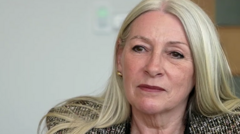Did the Council Leader Go Too Far with the 'Poor People' Post?

Understanding the Implications of Social Media Missteps: The Case of Council Leader Kay Mason Billig
In an age where social media can amplify both personal and public sentiments, the recent controversy surrounding Norfolk County Council's Conservative leader, Kay Mason Billig, serves as a stark reminder of how a single post can lead to widespread backlash. Billig sparked outrage by sharing a picture of an extravagant steak dinner with a caption that insinuated a disconnect with the struggles of less fortunate individuals. This incident has triggered a wave of responses from political figures and the public, raising questions about the responsibilities of elected officials in the digital age. In this article, we will delve into the details of this incident, explore its implications, and discuss how politicians can navigate the complexities of social media while remaining empathetic to their constituents.
The Incident: A Social Media Post That Backfired
On a seemingly innocuous evening, Kay Mason Billig posted a photo on her personal Facebook page showcasing a lavish tomahawk steak, a glass of red wine, and a vibrant salad. Accompanying the image was a line that read, "Wonder what all the poor people are doing?" The post quickly attracted attention, and not the kind that Billig likely anticipated. Critics, including members of the council's Liberal Democrat group, interpreted the post as insensitive and out of touch with the realities faced by many residents in Norfolk.
The Reaction: Calls for Accountability
The backlash was swift. Brian Watkins, the Liberal Democrat group leader, condemned Billig's comments, stating they trivialized the struggles faced by many in the community. He went so far as to call for her resignation, arguing that a council member should always be mindful of their public persona, regardless of the platform used. Similarly, Labour group leader Steve Morphew labeled Billig's remarks as indicative of someone who is "out of touch" with the needs of the community they represent.
In response to the mounting criticism, Billig issued an apology, stating that the post was meant to be a private joke and was not intended to offend anyone. She explained that she and her husband often refer to themselves as "the poor people" when enjoying a rare treat, emphasizing that the comment was self-deprecating rather than derogatory. Despite her explanation, the damage had been done, and the incident highlighted the precarious balance politicians must maintain in their public and private lives.
The Importance of Context in Social Media Communication
One of the core issues raised by this incident is the importance of context in social media communication. In a world increasingly dominated by digital interactions, messages can easily be misconstrued when stripped of their intended context. What may seem like a harmless joke to one person can be perceived as deeply offensive to another, particularly when sensitive topics like poverty are involved.
Understanding Social Media's Role in Politics
Politicians today are expected to engage with their constituents through various social media platforms. This engagement can foster a sense of community and transparency but also comes with significant risks. A few key factors to consider include:
- Public Perception: The public's perception of a politician can be shaped by their social media presence. A poorly timed or insensitive post can lead to a rapid decline in public trust.
- Viral Nature of Content: Social media posts can spread like wildfire, reaching audiences far beyond the intended followers. Once a post goes viral, it can be challenging to control the narrative.
- Accountability: Elected officials must recognize that they are never truly "off duty." Their actions and words, even in private communications, can reflect on their professional roles.
Lessons Learned: Navigating the Digital Landscape
In light of the controversy surrounding Kay Mason Billig, there are several lessons that politicians can take away to navigate the complexities of social media successfully:
1. Think Before You Post
Before sharing anything on social media, it’s crucial for public figures to pause and consider how their words might be interpreted. A moment of reflection can prevent a potential public relations crisis.
2. Understand Your Audience
Politicians should be acutely aware of the diverse backgrounds and experiences of their constituents. A message that may resonate well with one demographic can alienate another. Understanding the audience is key to effective communication.
3. Embrace Empathy
Empathy should be at the forefront of any public communication, especially when discussing sensitive topics such as economic hardship. Acknowledging the struggles faced by others can help build rapport and trust.
4. Be Prepared for Backlash
In a digital age where opinions can spread rapidly, politicians should be prepared for backlash. Having a public relations strategy in place can help mitigate damage and respond effectively to criticism.
5. Separate Personal and Professional Accounts
Maintaining a clear distinction between personal and professional social media accounts can help politicians avoid the pitfalls of inappropriate posts. While personal accounts can foster authenticity, they can also blur the lines of accountability.
Conclusion: The Future of Political Communication in a Digital Age
The incident involving Kay Mason Billig serves as a cautionary tale for politicians navigating the ever-evolving landscape of social media. As public figures, they must balance authenticity with accountability, ensuring their communications resonate positively with their constituents. In an era where a single post can have far-reaching consequences, understanding the implications of social media is more critical than ever.
As we move forward, let us reflect on the importance of empathy and understanding in our communications—both online and offline. How can we ensure that our words contribute positively to the dialogue around sensitive issues? What measures can we take to maintain transparency while embracing digital platforms? The answers to these questions may shape the future of political communication.
FAQs
What sparked the controversy involving Kay Mason Billig?
The controversy was sparked by a Facebook post where Kay Mason Billig shared a picture of an extravagant steak dinner with a caption that appeared insensitive to those struggling financially.
What was Billig's response to the backlash?
Billig apologized unreservedly, stating that the post was a private joke and not intended to offend anyone. She expressed disappointment that her words were taken out of context.
Why is social media important for politicians?
Social media allows politicians to engage directly with their constituents, share updates, and foster a sense of community. However, it also poses risks regarding public perception and accountability.
How can politicians avoid social media blunders?
Politicians can avoid blunders by thinking before posting, understanding their audience, embracing empathy, and maintaining a clear distinction between personal and professional accounts.
What are the broader implications of this incident for political communication?
This incident highlights the need for politicians to be mindful of their communications on social media. It underscores the importance of empathy and context in public discourse, particularly regarding sensitive issues.
As we reflect on the complexities of political communication in the digital age, what strategies can you think of that might help bridge the gap between public figures and their constituents? #PoliticalCommunication #SocialMedia #EmpathyInPolitics
Published: 2025-06-20 17:22:24 | Category: technology



